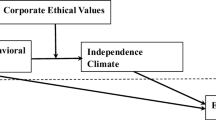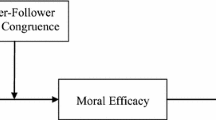Abstract
This study empirically examines the proposition that ethical leadership may affect individuals’ task performance through enhancing employees’ promotive voice. Our theoretical model was tested using data collected from employees and supervisors in a high-tech company located in South China. Analyses of multisource three-wave data from 37 team supervisors and 176 employees showed that ethical leadership could significantly affect individuals’ task performance through promotive voice. Further, it was found that the relationship between ethical leadership and promotive voice was moderated by leader–leader exchange. Specifically, ethical leadership may significantly enhance employees’ promotive voice when leader–leader exchange is low. The theoretical and practical implications of these findings are discussed.




Similar content being viewed by others
Notes
More information about the R program can be found at http://www.quantpsy.org.
References
Bauer, D. J., Preacher, K. J., & Gil, K. M. (2006). Conceptualizing and testing random indirect effects and moderated mediation in multilevel models: New procedures and recommendations. Psychological Methods, 11, 142–163.
Berg, J. H. (1984). Development of friendship between roommates. Journal of Personality and Social Psychology, 46, 346–356.
Blanc, P. M., & Gonzalez-Roma, V. (2012). A team level investigation of the relationship between leader-member exchange (LMX) differentiation, and commitment and performance. Leadership Quarterly, 23, 534–544.
Blau, P. M. (1964). Exchange and power in social life. New York, NY: Wiley.
Brislin, R. W. (1980). Translation and content analysis of oral and written material. In H. C. Triandis & J. W. Berry (Eds.), Handbook of cross-cultural psychology (pp. 398–444). Boston, MA: Allyn & Bacon.
Brown, M. E., & Trevino, L. K. (2006). Ethical leadership: A review and future directions. Leadership Quarterly, 17, 595–616.
Brown, M. E., Trevino, L. K., & Harrison, D. A. (2005). Ethical leadership: A social learning perspective for construct development and testing. Organizational Behavior and Human Decision Processes, 97, 117–134.
Burris, E. R. (2012). The risks and rewards of speaking up: Managerial responses to employee voice. Academy of Management Journal, 55, 851–875.
Chan, S. C. H., & Mak, W. M. (2012). Benevolent leadership and follower performance: The mediating role of leader-member exchange (LMX). Asia Pacific Journal of Management, 29, 285–301.
Chen, A. S., & Hou, Y. H. (2015). The effects of ethical leadership, voice behavior and climates for innovation on creativity: A moderated mediation examination. Leadership Quarterly, 27(1), 1–13.
Detert, J. R., & Burris, E. R. (2007). Leadership behavior and employee voice: Is the door really open? Academy of Management Journal, 50, 869–884.
Eisenberger, R., Stinglhamber, F., Vandenberghe, C., Sucharski, I. L., & Rhoads, L. (2002). Perceived supervisor support: Contributions to perceived organizational support and employee retention. Journal of Applied Psychology, 87, 565–573.
Fuller, J. B., Barnett, T., Hester, K., Relyea, C., & Frey, L. (2007). An exploratory examination of voice behavior from an impression management perspective. Journal of Managerial Issues, 29, 134–151.
Gao, L. P., Janssen, O., & Shi, K. (2011). Leader trust and employee voice: The moderating role of empowering leader behaviors. Leadership Quarterly, 22, 787–798.
Graen, G. B., & Uhl-Bien, M. (1995). Relationship-based approach to leadership: Development of leader-member exchange (LMX) theory of leadership over 25 years: Applying a multi-level multi-domain perspective. Leadership Quarterly, 6, 219–247.
Gu, Q. X., Tang, T. L. P., & Jiang, W. (2015). Does moral leadership enhance employee creativity? Employee identification with leader and leader-member exchange (LMX) in the Chinese context. Journal of Business Ethics, 126, 513–529.
Hsiung, H. H. (2012). Authentic leadership and employee voice behavior: A multi-level psychological process. Journal of Business Ethics, 107, 349–361.
Kish-Gephart, J. J., Detert, J. R., Trevino, L. K., & Edmondson, A. C. (2009). Silenced by fear: The nature, sources, and consequences of fear at work. Research in Organizational Behavior, 29, 163–193.
Lawler, E. J. (2001). An affect theory of social exchange. American Journal of Sociology, 107, 321–352.
Liang, J., Farh, C. I. C., & Farh, J. L. (2012). Psychological antecedents of promotive and prohibitive voice: A two-wave examination. Academy of Management Journal, 55, 71–92.
Likert, R. (1967). The human organization: Its management and value. New York, NY: McGraw-Hill.
Liu, J., Kwan, H. K., Fu, P. P., & Mao, Y. (2013). Ethical leadership and job performance in China: The roles of workplace friendships and traditionality. Journal of Occupational and Organizational Psychology, 86, 564–584.
Liu, W., Tangirala, S., Lam, W., Chen, Z. G., Jia, R. T., & Huang, X. (2015). How and when peers’ positive mood influences employees’ voice. Journal of Applied Psychology, 100, 976–989.
Masterson, S. S., Lewis, K., Goldman, B. M., & Taylor, M. S. (2000). Integrating justice and social exchange: The differing effects of fair procedures and treatment on work relationships. Academy of Management Journal, 43, 738–748.
Maynes, T. D., & Podsakoff, P. M. (2014). Speaking more broadly: An examination of the nature, antecedents, and consequences of an expanded set of employee voice behavior. Journal of Applied Psychology, 99, 87–112.
Mo, S. J., & Shi, J. Q. (2015). Linking ethical leadership to employee burnout, workplace deviance and performance: Testing the mediating roles of trust in leader and surface acting. Journal of Business Ethics, online first.
Mo, S. J., Wang, Z. M., Akrivou, K., & Booth, S. (2012). Look up, look around: Is there anything different about team-level OCB in China? Journal of Management & Organization, 18, 833–844.
Morrison, E. W. (2011). Employee voice behavior: Integration and directions for future research. Academy of Management Annals, 5, 373–412.
Muthen, L. K., & Muthen, B. O. (2007). Mplus user’s guide (5th ed.). Los Angeles: Author.
Ng, T. W. H., & Feldman, D. C. (2012). Employee voice behavior: A meta-analytic test of the conservation of resources framework. Journal of Organizational Behavior, 33, 216–234.
Pearce, C. L., & Herbik, P. A. (2004). Citizenship behavior at the team level of analysis: The effects of team leadership, team commitment, perceived team support, and team size. The Journal of Social Psychology, 144, 293–310.
Podsakoff, P. M., MacKenzie, S. B., Lee, J., & Podsakoff, N. P. (2012). Sources of method bias in social science research and recommendations on how to control it. Annual Review of Psychology, 65, 539–569.
Preacher, K. J., Zyphur, M. J., & Zhang, Z. (2010). A general multilevel SEM framework for assessing multilevel mediation. Psychological Methods, 15, 209–233.
Seibert, S. E., Kraimer, M. L., & Crant, J. M. (2001). What do proactive people do? A longitudinal model linking proactive personality and career success. Personnel Psychology, 54, 845–874.
Tangirala, S., Green, S. G., & Ramanujam, R. (2007). In the shadow of the boss’s boss: Effects of supervisors’ upward exchange relationships on employees. Journal of Applied Psychology, 92, 309–320.
Treviño, L. K., Brown, M., & Hartman, L. P. (2003). A qualitative investigation of perceived executive ethical leadership: Perceptions from inside and outside the executive suite. Human Relations, 56, 5–37.
Van Dyne, L., Ang, S., & Botero, I. C. (2003). Conceptualizing employee silence and employee voice as multidimensional constructs. Journal of Management Studies, 40, 1359–1392.
Van Dyne, L., & LePine, J. A. (1998). Helping and voice extra-role behaviors: Evidence of construct and predictive validity. Academy of Management Journal, 41, 108–119.
Zhang, Y. W., LePine, J. A., Buckman, B. R., & Wei, F. (2014). It’s not fair…or is it? The role of justice and leadership in explaining work stressor-job performance relationships. Academy of Management Journal, 57, 675–697.
Zhou, L., Wang, M., Chen, G., & Shi, J. Q. (2012). Supervisors’ upward exchange relationships and subordinate outcomes: Testing the multilevel mediation role of empowerment. Journal of Applied Psychology, 97, 668–680.
Zhu, W. C., He, H. W., Trevino, L. K., Chao, M. M., & Wang, W. Y. (2015). Ethical leadership and follower voice and performance: The role of follower identifications and entity morality beliefs. Leadership Quarterly, 26, 702–718.
Acknowledgments
This research was supported in part by Grant No. 71302102 awarded to Shenjiang Mo and Grant No. 71425004 awarded to Junqi Shi from the National Natural Science Foundation of China.
Author information
Authors and Affiliations
Corresponding author
Rights and permissions
About this article
Cite this article
Mo, S., Shi, J. The Voice Link: A Moderated Mediation Model of How Ethical Leadership Affects Individual Task Performance. J Bus Ethics 152, 91–101 (2018). https://doi.org/10.1007/s10551-016-3332-2
Received:
Accepted:
Published:
Issue Date:
DOI: https://doi.org/10.1007/s10551-016-3332-2




